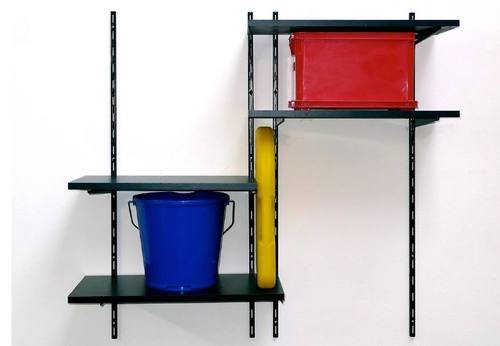Ultramoderne
dal 18/9/2007 al 3/11/2007
Segnalato da
Armando AndradeTudela
Gotz Arndt
Ben Laloua
Didier Pascal
Karina Bisch
Karla Black
Katinka Bock
Simon Boudvin
Martin Boyce
Valentin Carron
Nicolas Chardon
Stephane Dafflon
Daniel Dewar
Gregory Gicquel
Jason Dodge
Toni Grand
Experimental Jetset
Roger Hiorns
Chris Johanson
Pierre Leguillon
Genet Mayor
Damien Mazieres
Yann Geraud
Mathieu Mercier
Gyan Panchal
Diogo Pimentao
Falke Pisano
Lili Reynaud Dewar
Soraya Rhofir
Evariste Richer
Clement Rodzielski
Team Tchm
Jan van der Ploeg
Jens Wolf
Raphael Zarka
Tiphanie Blanc
Yann Chateigne
Alex Reding
18/9/2007
Ultramoderne
Espace Paul Wurth, Luxembourg - Hollerich
The show introduces a set of forms, every detail of which has been the subject of negotiation from the modes of construction, of exhibition and of communication. It will be a place both physical and mental, for although it is clearly situated, it will also intervene in the public realm outside the exhibition space.

Group show
“The object of nature is man, the object of man is style.”
Theo van Doesburg, 1918
“Space does not exist for the eye only; it is not a painting: one wants to live in it.”
El Lissitzky, 1923
Ultramoderne was born of a desire to imagine a place, to imagine an exhibition as a form that
implies various parameters, each of which may be called into question. The process chosen
for its development therefore imposes a rule to all participants in the shape of a proposal,
which consists of asking them to take charge of one particular aspect of the exhibition. The
previously defined functions of the space generate an agenda that can be likened to an
architecture programme. Various modalities of interventions capable of meeting the full range
of the project’s requirements unfold around a series of general functions – “meeting”,
“shaping”, “archiving”, “communicating” and “selecting” – representing different
possibilities to intervene, oppose or supersede a series of elements that define the shape of the
project. Each of these functions implies a string of other functions, which can only be
conceived of as closely interrelated. These multiple propositions within the project will thus
compose the landscape of the exhibition, while ensuring that the final outcome may not be
predicted.
The show introduces a set of forms, every detail of which has been the subject of negotiation
– from the modes of construction, of exhibition and of communication. It will thus bear the
signs produced by a temporary community, which was required to reinvent its global
framework of appearance – be it real or supposed. It will be a place both physical and mental,
for although it is clearly situated, it will also intervene in the public realm outside the
exhibition space.
It opens question a series of historical models. Its topical focus consists in putting the
principles underlying these models to the test in another context and revealing both their
potentials and their limitations. The exhibition will showcase a group of artists from different
countries working in various fields, who will be asked to contribute the referents they
manipulate: notions of utilization and functionality of artworks, the use of a repertory of
forms related to early abstractions, the idea of community or common memory, or ways of
living. Modernity, as the common basis of a wide array of practices, also reveals historic,
cultural and political differences provided one considers its history on a global scale.
The project thus relies on shared practices and referents articulated around a common project.
Yet it is not to affirm “an objective and universal means of creation” (Theo van Doesburg,
Conference of Progressive Artists, Düsseldorf, 1922), but to rely at the margins of utopias as a
way of experimenting a different mode of producing, exhibiting and establishing a Ultramoderne est réalisé dans le cadre de « Luxembourg & Grande Région, Capitale européenne de la Culture
2007 », sous le Haut Patronage de leurs Altesses Royales le Grand-Duc et la Grande-Duchesse, et avec le soutien de : L’Ambassade Royale des Pays-Bas au Luxembourg – Mondriaan Foundation, Amsterdam –
CULTURESFRANCE – Multiplan Group – Centre Culturel Français, Luxembourg.
Relationship between the work of art, the place and the public. Standards of the regular
exhibition space are supplanted by other possible standards; in other words the
standardization of spaces is countered by shared structures, which may in turn become the
new standards. The works, objects and images, whether new or existing, reformulated or
reactivated in this particular context, thus challenge spectators to read the exhibition on
various levels. Visitors are invited to explore a space and a sequence of works whose status,
oscillating between exhibition display and decor, architecture and World Exhibition pavilion,
is ambiguous, while investigating forms whose use value remains indeterminate.
Among many others the Café de l’Aubette in Strasbourg could provide a possible model for
the exhibition. This vast leisure complex, whose decoration had been designed by Hans and
Sophie Taeuber-Arp and Theo van Doesburg, operated between 1926 and 1928. The
decoration of the four-storey building consisted of the artists’ works in the dance halls, the
movie theatre, the brasserie, the cafés, the tearooms, the entrance hall with its bar, and the
billiard room. But the Aubette, which was to epitomize the teachings of De Stijl and represent
the most accomplished materialization of van Doesburg’s theories, lacked success.
Ultramoderne deals with the notions of project and failure alike. Cast between modern ideals
and ruins, the exhibition will appear to be in a state of perpetual construction or
deconstruction, refurbishment and entropy. The project thus counterbalances a sort of a
rebours manifesto with the necessary desire to ceaselessly reinvent, and a paradoxical look at
the past conceived as future, by means of staging a potential space.
A bilingual catalogue (French/English), 120 pages, A4, monochrome, edited with the support
of Multiplan Group, and an album of the exhibition, color poster, 60x40 cm, will be released
on the occasion of Ultramoderne http://www.artcontemporain.lu
Image: Mathie Mercier, Drum&Bass "easy", 2007
Opening: 19 september at 6pm
Espace Paul Wurth
rue de l'Acierie 1, Luxembourg-Hollerich
Free admission



